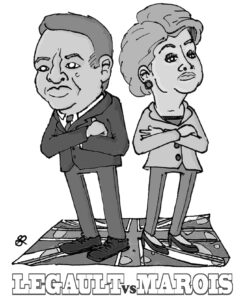
Recent developments have created a chance to highlight two very different approaches to the cause of Quebec nationalism. The first was the announcement of plans to protest the July visit of Prince William and his new bride Kate Middleton by certain Quebec nationalist groups. The second was the announcement of the formation of a new political coalition in Quebec that promises to eschew the cause of sovereignty, and instead focus on matters relating to Quebec’s future prosperity. These developments, which can both be seen as manifestations of Quebec’s nationalist movement, represent what is very much the past of that movement, and what seems likely to be its future.
The Réseau de résistance du Québec (RRQ) has promised to make the royal visit as “unpleasant as possible.” The RRQ is the same group whose threats of violent intervention forced the cancellation of the re-enactment of the battle of the Plains of Abraham in 2008. Their list of grievances against the British monarchy include the assimilation of francophones and the deportation of the Acadians in 1775.
More related to contemporary Quebec politics was last month’s announcement of the formation of a new political coalition: the Coalition pour l’avenir du Québec. Its leader is Francois Legault, a former Parti Québécois minister. He claims that sovereignty has become a dead end in Quebec, and that nationalists must move on and tackle real issues affecting Quebec’s population, such as the province’s future prosperity and its ability to remain competitve economically. As such, the group is calling for better pay and a more effective evaluation process for the province’s educators, tuition hikes and increased funding to deal with the chronic underfunding of the province’s universities, and a re-evaluation of taxation to encourage private investment in the province.
While not an official political party, Legault has stated that the Coalition could turn into one if its suggestions are not adopted by any of Quebec’s current mainstream parties.
These two recent developments within Quebec nationalism very much epitomize both the past and the future of that movement. Groups such as the RRQ, who seem intent on focusing their energies on protesting against the visit of two 20-somethings to Quebec, have clearly lost sight of both the interests of the province and the interests of Quebec’s nationalist movement. While their protest will surely be carried out in the name of Quebec and Quebecois nationalism, it is very hard to see how protesting the royal visit will further the cause of either one.
In contrast, the Coalition pour l’avenir du Québec seems to have it right. The cause of independence or even increased sovereignty for the province of Quebec is simply not that popular anymore, nor is rabid anti-royalism. The Coalition has instead, and rather wisely, chosen to further both the interests of Quebec and of nationalism by working towards specific goals that are actually in Quebec’s “national” interests.
In an era where political sovereignty is becoming increasingly less important, and when the ability to compete economically is becoming ever more of a priority, it makes perfect sense that the goal of working towards Quebec’s economic prosperity would surpass it’s goal of political independence, and of harping on about centuries-old wrongs as the main focus of nationalism in the province. In that sense, it seems likely that groups such as the RRQ represent the past of Quebec’s nationalist movement, while practical-minded groups such as the Coalition represent its future.





Comments are closed.